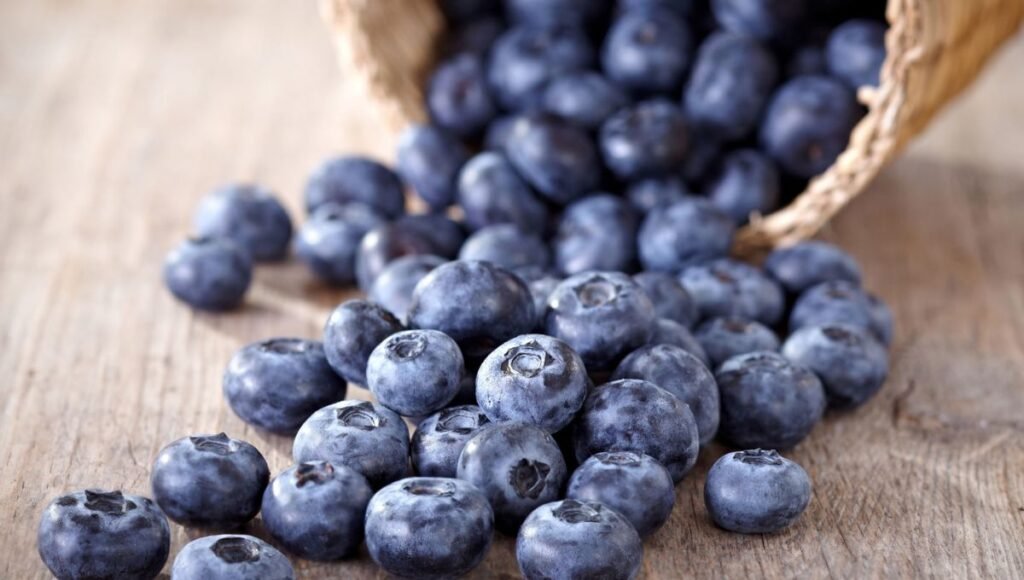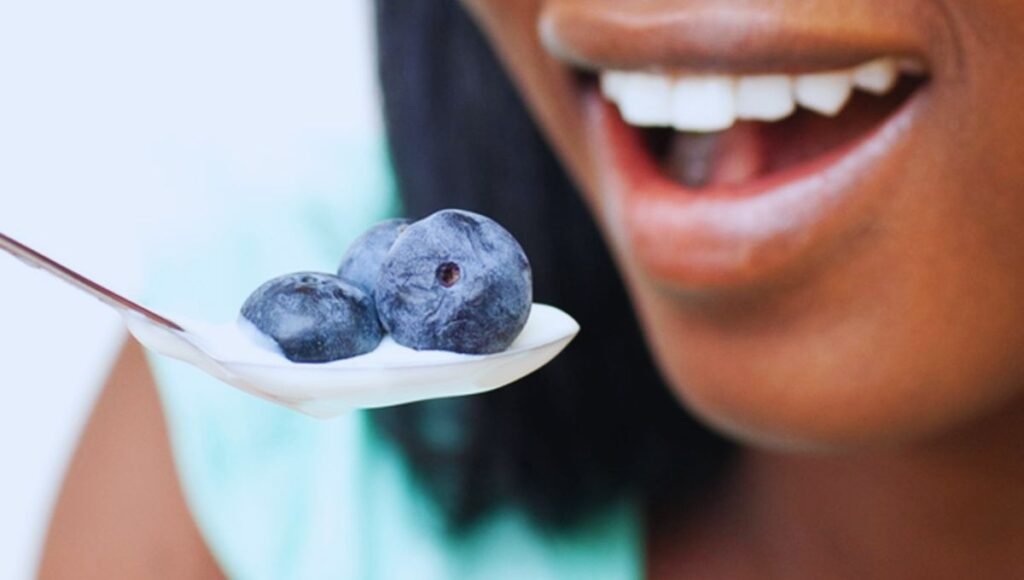Can I Eat Blueberries After Tooth Extraction?
You’ve just had a tooth extraction and might be wondering if you can treat yourself to some blueberries, right? Generally, blueberries are viewed as safe due to their soft texture and nutritional benefits that may aid in your recovery. They’re packed with vitamins and antioxidants which can help reduce inflammation and boost your immune system.
However, it’s important to take into account the form in which you consume them. Opting for blueberries in a smoothie or puree might be best to avoid disturbing the extraction site. Curiously, there are other factors and foods to ponder that could impact your healing process. What might they be?
Understanding Tooth Extraction Recovery

Understanding the recovery process after a tooth extraction is essential for ensuring a smooth and effective healing period. You’ll need to focus on two pivotal aspects: pain management and maintaining oral hygiene.
After the procedure, it’s normal to experience some discomfort, but managing this pain is essential to prevent it from affecting your daily activities. Your dentist will likely recommend over-the-counter pain relievers such as ibuprofen or acetaminophen. It’s important you follow the prescribed dosage and schedule to keep discomfort at bay. Sometimes, your dentist might prescribe stronger painkillers, especially if your tooth extraction was complex. Make sure you use these medications strictly as directed to avoid any potential side effects.
Oral hygiene, on the other hand, can’t be neglected even though your mouth might be tender. Start by gently rinsing your mouth with warm salt water after meals to help keep the area clean. This not only soothes your mouth but also helps in reducing the risk of infection. Avoid vigorous rinsing or spitting in the initial days as this can dislodge the blood clot forming in the socket, which is essential for healing.
Instead, brush your teeth gently around the extraction site, steering clear of the surgical area to prevent irritation.
Benefits of Blueberries for Healing
Blueberries, packed with antioxidants and vitamins, can greatly enhance your healing process after a tooth extraction. These small, yet powerful fruits offer a range of healing benefits that are particularly useful during your recovery. Rich in vitamin C, blueberries help to boost your immune system, speeding up your recovery by fighting off potential infections.
The antioxidants present in blueberries, including flavonoids and anthocyanins, reduce inflammation and can help minimize swelling and discomfort that often follow a tooth extraction.
Incorporating blueberries into your diet post extraction not only aids in your healing but also provides a gentle, nutritious snack option when your mouth may still be tender. These berries are soft and require minimal chewing, reducing the risk of irritating the extraction site.
They’re also high in fiber, which is essential for maintaining good overall health, but gentle enough not to disturb the healing tissues.
Eating blueberries after your extraction can be a smart way to promote healing while enjoying a delicious and nutritious treat. Their natural sweetness and nutritional profile make them an ideal choice during the recovery phase, helping you heal faster and more comfortably.
Best Practices for Eating Blueberries
Now that you know the health benefits of blueberries post-tooth extraction, let’s look at how best to incorporate them into your diet to maximize healing.
Initially, it’s important to consume foods that are gentle on your surgical site. Opt for consuming blueberries in a softened form such as a smoothie or a puree. This method ensures that you’re getting the nutritional benefits without risking harm to the sensitive area.
A simple blueberry smoothie can be made by blending fresh or frozen blueberries with a scoop of protein powder and some yogurt or almond milk. This not only soothes your mouth but also provides protein, essential for tissue repair.
For an even gentler option, blueberry applesauce is easy to prepare and equally nutritious.
Incorporating blueberries into your diet through these soft recipes helps you take advantage of their high vitamin C and K content, both important for healing. Furthermore, the antioxidants present in blueberries aid in reducing inflammation, which is essential after an extraction.
Foods to Avoid After Extraction

While it’s important to include soft, nutritious foods like blueberries in your diet post-extraction, you’ll also need to steer clear of certain foods that can impede your healing process. Managing your diet carefully can be essential for a smooth recovery.
Here’s a list of foods to avoid to make sure you don’t hinder your healing:
- Crunchy and Hard Foods: Stay away from nuts, chips, and popcorn. These can create risky pressure on the extraction site and may introduce particles that irritate the wound.
- Sticky and Chewy Foods: Foods like caramel, taffy, and even dense breads can pull on the extraction area, potentially dislodging the blood clot that’s necessary for healing.
- Spicy and Acidic Foods: Spices and acidic foods, such as tomatoes and citrus fruits, can irritate the wound, causing discomfort and slowing down the healing process.
- Extremely Hot Foods and Beverages: While soft foods and cold foods are generally safe, very hot substances can increase swelling and disrupt the clotting process, leading to complications like dry socket.
Avoiding these foods will help you maintain a diet that supports healing, focusing on soft, soothing options that don’t strain your recovery.
Signs of Proper Healing Progress
After adjusting your diet to avoid certain foods, you should monitor your healing to guarantee it’s progressing well. Recognizing the signs of proper recovery according to the healing timeline is essential.
Initially, it’s normal to experience some swelling and discomfort, but these symptoms should gradually decrease within the first 72 hours. Effective pain management is key; minimal pain that diminishes over days is a good indicator that your body is healing correctly.
By the end of the first week, you should notice a significant reduction in swelling and pain. If you’re managing your pain well and it isn’t intensifying, it’s a positive sign. Also, the extraction site should start to look healthier—less redness and no signs of pus or excessive bleeding. These are clear indicators that the site isn’t infected and is healing properly.
Around two weeks post-extraction, new tissue should begin forming at the extraction site, and any discomfort should be minimal or completely gone. If you’re following the recommended guidelines for care, including maintaining oral hygiene and sticking to appropriate foods, you’ll likely experience smooth and steady healing.
Always consult your dentist if you’re unsure or if your symptoms seem to worsen unexpectedly.
Frequently Asked Questions
Can Blueberry Seeds Impact Tooth Extraction Sites?
Yes, blueberry seeds can impact tooth extraction sites by getting lodged, possibly disrupting the healing process. It’s important to maintain oral hygiene post-extraction to avoid complications during seed removal.
Are Blueberry Smoothies Safe Immediately After Extraction?
Yes, you can enjoy blueberry smoothies after your extraction. They’re cold and soft, aiding comfort and healing. Blend with yogurt or ice cream for a soothing, nutritious option during your recovery period.
How Soon Can I Eat Dried Blueberries Post-Extraction?
You should wait until your healing time allows for firmer foods before eating dried blueberries. Stick to soft foods and consider blueberry alternatives to guarantee best healing and safe blueberry consumption post-extraction.
Can Blueberries Stain a Dry Socket Dressing?
You should avoid blueberries after your extraction due to the staining risk and seeds potentially disrupting the healing process. Opt for softer, lighter-colored foods to protect the dry socket dressing.
Is Blueberry Juice Less Irritating Than Whole Blueberries After Extraction?
Yes, blueberry juice is less irritating than whole blueberries after an extraction because it’s smoother and fits a soft diet better, offering antioxidant benefits without the risk of disturbing the extraction site.
Conclusion
After your tooth extraction, it’s safe and beneficial to enjoy blueberries. Opt for smoothies or purees to protect the extraction site. These forms not only prevent discomfort but also maximize the healing benefits of blueberries.
Remember to steer clear of hard, crunchy foods that could impede your recovery. Keep an eye on your healing progress, and consult your dentist if you notice any unusual symptoms.
Eating right, including blueberries, can greatly enhance your healing journey.